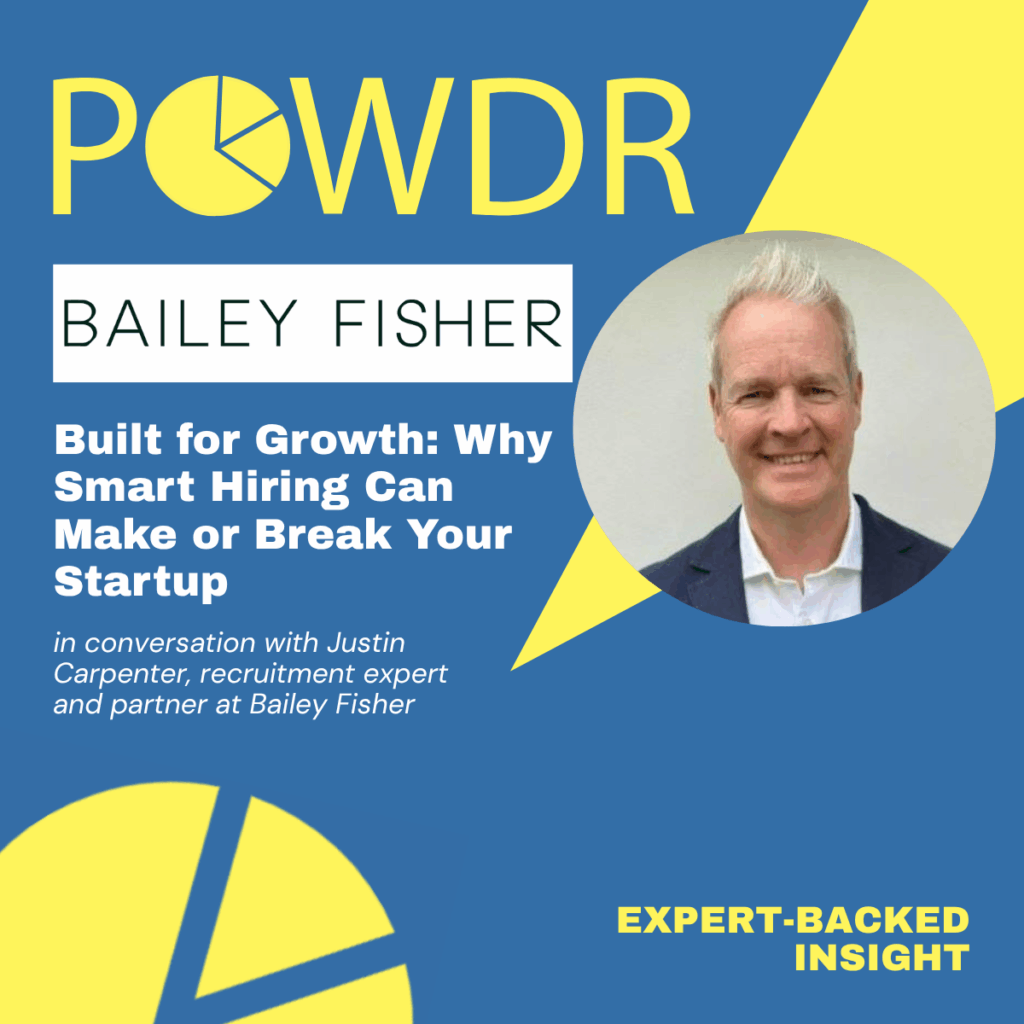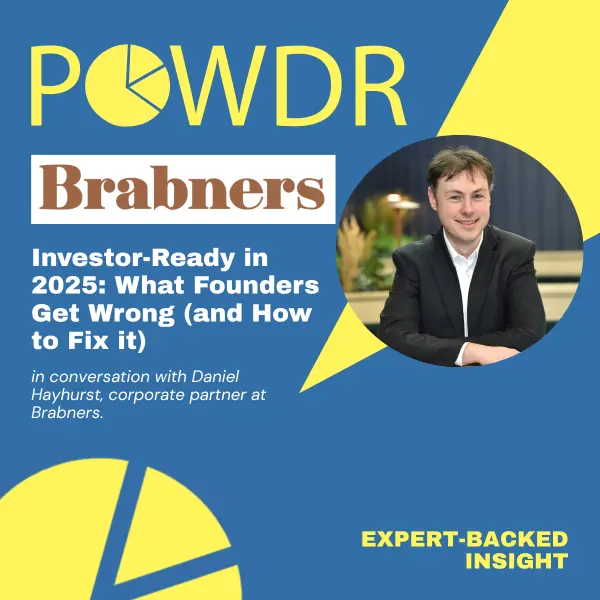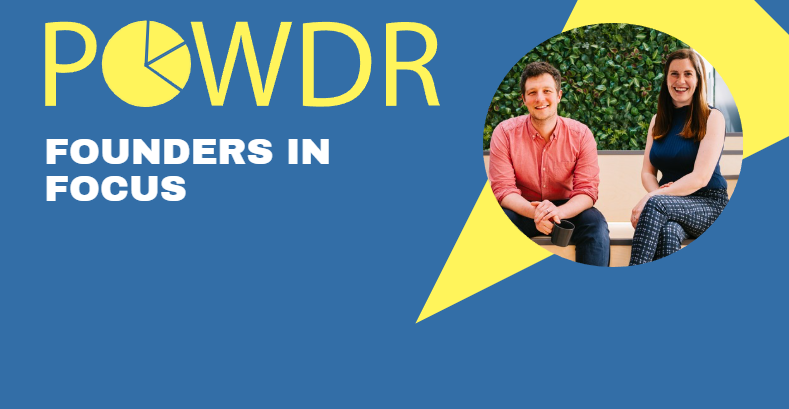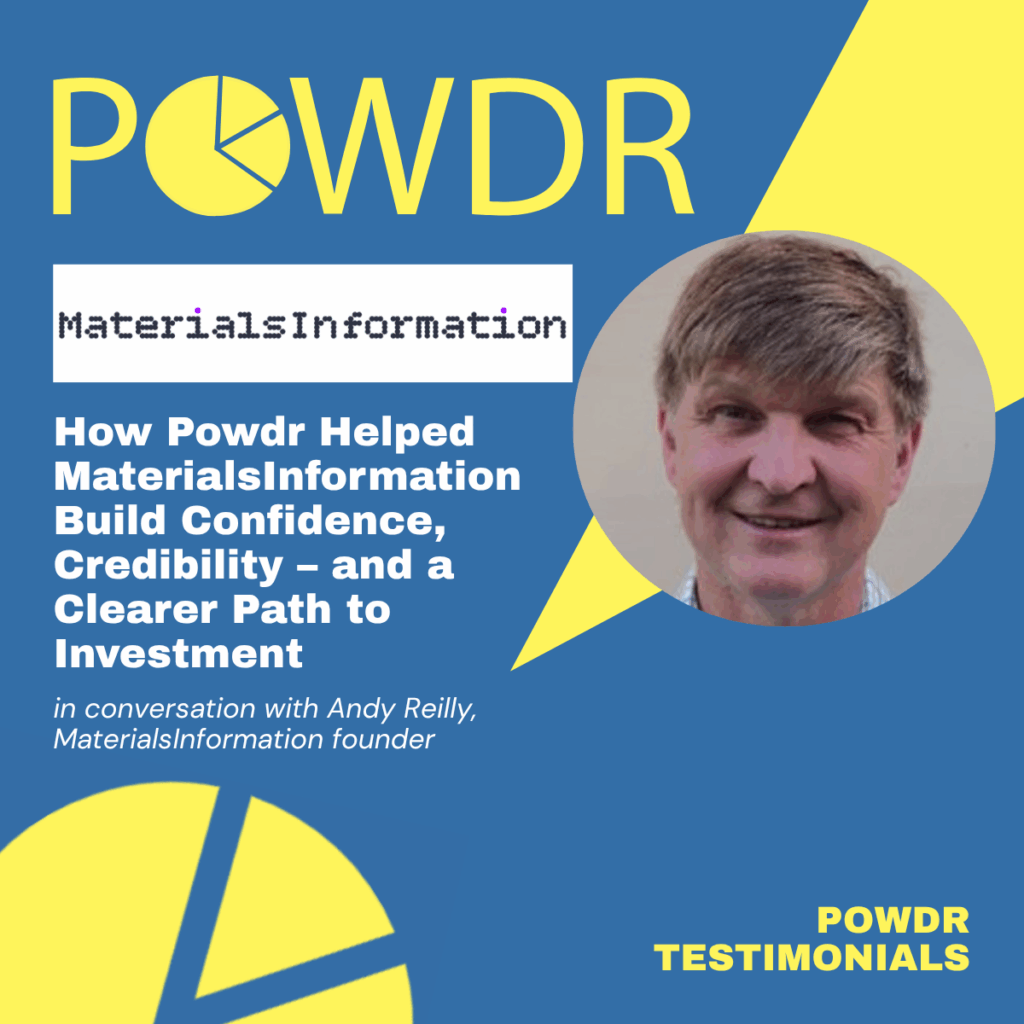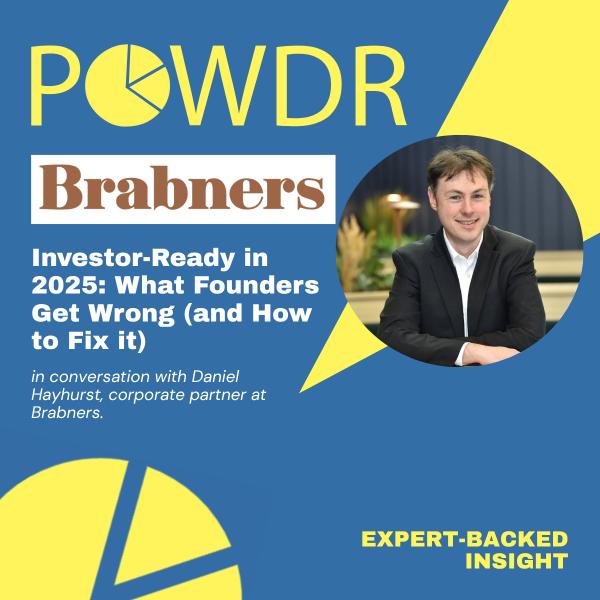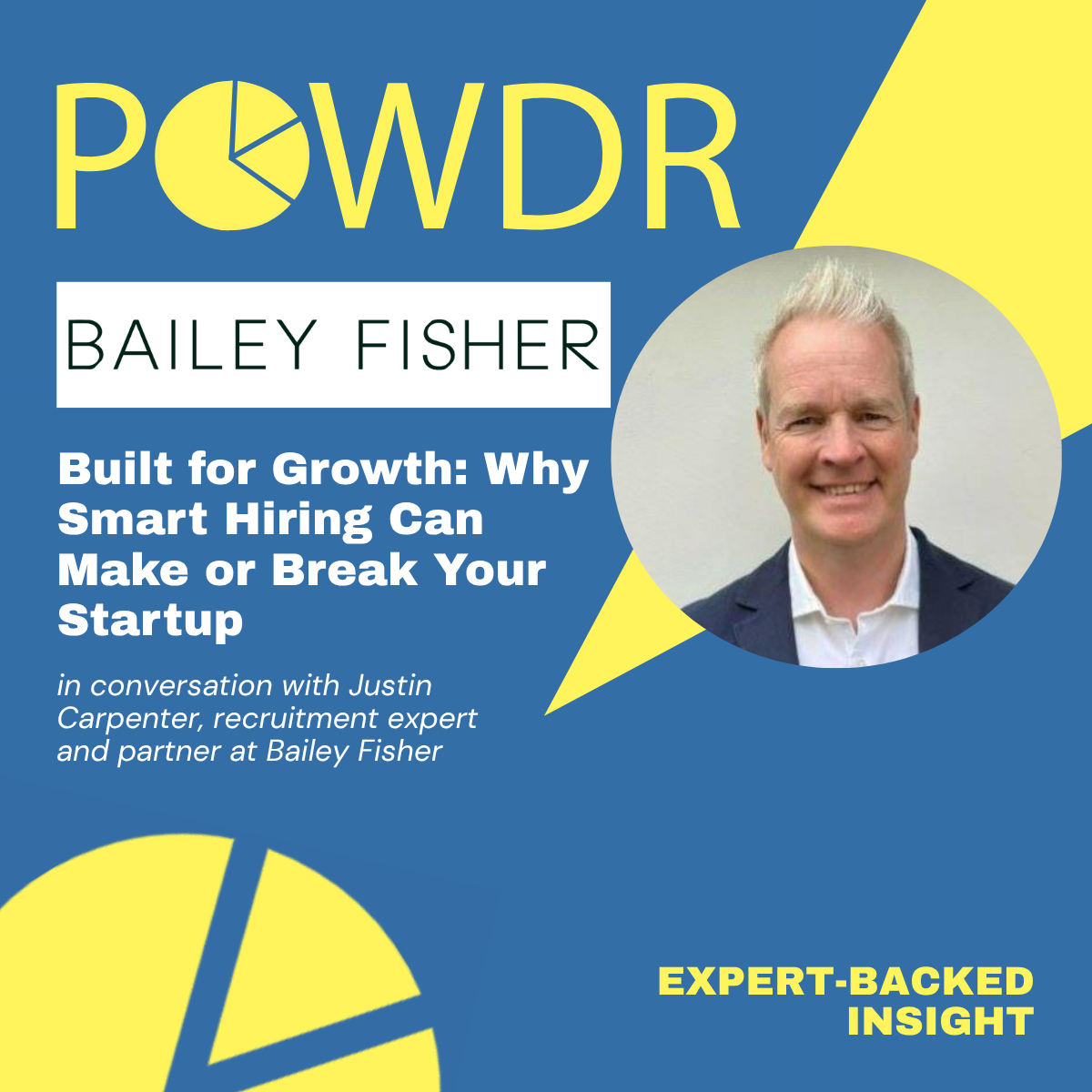By Soni Zaman, Powdr, in conversation with Justin Carpenter, recruitment expert and partner at Bailey Fisher. Part of Powdr’s ‘Founders in Focus’ Series – created with insight from the experts who support founders prepare, plan and raise.
Hiring might be one of the most consequential decisions a founder makes – but it’s also one of the most misunderstood. To shed light on the realities of recruitment in fast-growing startups, we sat down with Justin Carpenter, a specialist in building senior teams for early-stage ventures.
This is the second article in Founders in Focus – a thought leadership series built around real founder questions, real scenarios, and expert insight from legal, recruitment, and advisory professionals. Whether you’re planning your next hire, preparing to raise investment, or simply scaling with more confidence, this series offers a shortcut to smarter planning and stronger outcomes.
That CFO might be perfect – just not for you
One of the most common early mistakes? Being dazzled by big names. As Justin points out, “Startups often see a former CFO from Microsoft for example and think: this is it.” But while that individual may be brilliant, they might not thrive in your environment.
“Big-company hires are used to structure, clarity, and support,” he explains. “At a startup, you’re often hiring a CFO who is also your Head of Ops, IT lead, HR manager, and everything in between.” The same goes for sales, marketing, and product roles – you need generalists who are comfortable building as they go, not just managing an existing machine.
Hire for outcomes, not just job titles
Justin urges founders to rethink job specs altogether. “Don’t start with the job title. Start with the outcome.”
In practical terms: what are you trying to achieve in the next 6–12 months? What capabilities or capacity gaps are holding you back? Sometimes, founders jump to hiring a CFO when what they really need is a financial controller. Or they bring in a sales lead before their product is ready to sell. Getting this wrong means you either frustrate your team or burn through runway without return.
“It’s about understanding what the business needs now,” says Justin, “and matching the role to that – not just copying what a more mature business might do.”
A hiring plan is a financial plan
Recruitment shouldn’t sit separately from your financial forecast. According to Justin, the two are intrinsically linked: “You can’t have a credible financial plan without a headcount strategy – most of your outgoings are people.”
Investors know this. That’s why they’re not just looking at salary costs – they want to see whether you’ve thought through who you need, when you’ll need them, and how you’ll find and retain them. Your hiring plan becomes part of the story you’re telling about scale.
“A forecast without a hiring plan is just wishful thinking,” Justin adds. “You need to show how those numbers will actually be delivered.”
A good financial model should help you to align hiring plan and financial forecasts so you can show investors a cohesive, evidence-backed narrative of how each hire drives growth, not just spend. Something that we here at Powdr excel at!
Get the timing right
Hiring at the wrong time is one of the biggest drains on early-stage resources. If you hire too early, your new recruit might not have the tools or environment they need to succeed. Too late, and you risk burning out the team or missing key opportunities.
You also need to look at outcomes for 12-36 months and hire against those desired outcomes. You ideally need someone that can scale with the business not just be able to execute on the near-term goals but also longer term (24 – 36 months) and be capable and willing to do the now and the future.
“Take sales, for example,” Justin says. “If your product isn’t ready, bringing in a salesperson too soon sets everyone up to fail – they’re frustrated, you’re out of pocket and you might even harm your reputation in the market.”
The same principle applies to every function. Understanding not just who to hire but when is crucial.
Think like a marketer, not just a hiring manager
Justin believes job descriptions are one of the most undervalued assets in a startup’s toolkit. “They’re often boring, vague, and generic,” he says. “They talk about what the company wants – not why someone should care.”
His advice? Treat every job like a product you’re trying to sell to a very specific audience. What problem does it solve for them? What makes it rewarding? What’s the real opportunity?
“If you want someone who’s proactive and creative, then your job advert needs to reflect that. And the best way to do that? Talk to your own team. Ask why they joined – that’s the story you should be telling the market.”
By visualising the impact of each hire on your growth journey, you can shape more compelling role narratives for ambitious candidates.
Can you grow from within?
Before defaulting to external recruitment, Justin advises founders to take a look inside. “Sometimes the capability is already in the business – you just need to unlock it.”
That might mean coaching someone internally, investing in training, or simply clarifying ownership. And when full-time senior hires aren’t feasible, consider fractional support: a part-time CMO or CFO can bring high-level expertise without the full cost burden.
“There are brilliant fractional professionals out there,” says Justin. “You get the benefit of their experience, and they can help you understand what kind of full-time hire you may need down the line.”
Avoid reactive hiring
Reactive hiring – especially under pressure – often leads to poor decisions. Someone resigns and the instinct is to quickly replace them. But Justin recommends taking a moment to step back.
“Use it as an opportunity to reflect,” he says. “Are the business goals the same as when you made the original hire? What skills do you actually need now? Don’t just rush to refill a role, rethink it.”
He adds that job specs should never just be lifted from a previous post or copied from online. “Founders put so much thought into their sales strategy. They should put the same effort into recruitment – it’s just as important to growth.”
As part of this effort, a business should be stress-test hiring timelines against projected revenue, product development milestones and cashflow forecasts – giving you greater confidence in when to invest in new talent. Financial models like you get with Powdr can help you achieve this with ease.
Culture isn’t about sameness – it’s about synchrony
Culture fit isn’t just about hiring people you get along with – it’s about hiring people who add value without derailing your rhythm.
Justin likens this to a rowing analogy he shared: “The fastest boat is one where the oars enter the water at the same time, pull evenly and rise in unison. That’s alignment. But you also want someone who can suggest a tweak to your form, something that makes you go faster – without upsetting the flow.”
In other words, hire people who understand your mission and working style, but who also challenge you to improve.
What founders often overlook
We asked Justin what one role or skillset early-stage founders often overlook. His answer? Mentorship.
“It doesn’t have to be a formal board appointment,” he says. “But having someone to talk to, someone experienced, who can help you see blind spots is invaluable. Startups are isolating and you can’t be an expert in everything.”
Even an hour a month with a seasoned operator can shape better decisions and help founders build with more clarity.
Final advice: Hire for outcomes. Be honest about the journey.
Justin’s parting words to founders were simple but powerful:
“Be absolutely clear on the outcomes you need each hire to deliver and be honest about where you are now.”
Don’t sugar-coat the challenges. If your finance function is still on pen and paper, say so. The right hire won’t be put off, they’ll be excited by the opportunity to build something meaningful.
Powdr makes it easier to tell that story – tracking your current position, surfacing priorities and giving your confidence in your cashflow with what will be one of your biggest expenses.
Before your next hire, ask:
- What do we want to achieve in the next 12 months?
- What capability or capacity are we missing?
- Can someone already in the team grow into this role?
- If not, who exactly do we need and what will attract them to this opportunity?
Smart hiring isn’t about filling gaps. It’s about building with intent. When your headcount plan aligns with your growth goals, you’re not just investing in people – you’re investing in your future.
Justin joined Bailey Fisher as a Partner in 2023 to head up the firm’s Manchester office. He brings over 25 years’ experience within executive search in technology and life sciences, working throughout the UK, Europe and the US. Justin has worked with clients ranging from very early stage startups through to publicly listed organisations, across many different sectors, including Medtech, Pharma, and Industrial Automation. He has a particular interest in emerging technologies, and an educational background in Mathematics, and has recruited in Data, Big Data and AI. ✉️ justin@baileyfisher.com ☎️ 07973 513728 🌐 https://www.baileyfisher.com
Ready to turn your hiring strategy into a growth engine? Powdr helps you align your team plans with your financial goals – so every hire moves your business forward.
